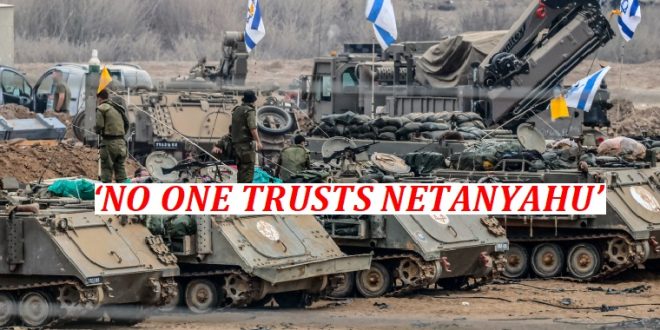01-11-2023
JERUSALEM: It took one tweet over the weekend for cracks to emerge within the Israeli political establishment.
Just after midnight on Sunday, Prime Minister Benjamin Netanyahu wrote that he had never been informed about warnings of Hamas’s assault on Israel on October 7. Netanyahu instead seemed to place the blame for the attack, where at least 1,400 people were killed, on his army and intelligence chiefs. They had assessed prior to the attack that Hamas “was deterred and ready for a settlement”, he noted.
 The statement caused an uproar. Political leaders slammed Netanyahu for playing politics while the country was in the midst of a difficult military campaign inside Gaza. The outrage was such that the prime minister deleted the tweet, and in an unusually sober tone, apologized for his words. “I was wrong,” he said.
The statement caused an uproar. Political leaders slammed Netanyahu for playing politics while the country was in the midst of a difficult military campaign inside Gaza. The outrage was such that the prime minister deleted the tweet, and in an unusually sober tone, apologized for his words. “I was wrong,” he said.
Experts say the episode confirmed a widening rift within the political and military establishment, one that questioned Netanyahu’s leadership and his capacity to navigate the country through war without prioritizing his own interests over national security.
“To say that he was out of order would be the understatement of the year,” said Yossi Mekelberg, associate fellow with the Middle East and North Africa Program at Chatham House.
“This is a very difficult military campaign so you want a responsible prime minister and there is not a single person [in the government] that trusts Netanyahu that’s the main issue for this cabinet,” Mekelberg said.
Soon after October 7, Netanyahu formed an emergency war cabinet by extending the Israeli governing coalition to a number of former senior military officers, drawn from the ranks of the opposition.
 One of them was Benny Gantz, a former defence minister, who swiftly demanded Netanyahu retract his controversial post while showing full support to the army and the Shin Bet, Israel’s domestic intelligence agency.
One of them was Benny Gantz, a former defence minister, who swiftly demanded Netanyahu retract his controversial post while showing full support to the army and the Shin Bet, Israel’s domestic intelligence agency.
A flurry of criticisms from other leaders followed. “[Netanyahu] is not interested in security, he is not interested in hostages, only politics,” said opposition lawmaker Avigdor Lieberman, once Netanyahu’s defence minister. Israel army’s top spokesperson Daniel Hagari declined to comment. “We are at war,” he said.
The fiery exchanges were the latest signs of tension within Israel’s political establishment including within the war cabinet as it grapples with the aftermath of one of the country’s biggest intelligence failures.
Many in the country’s security apparatus have admitted shortcomings, but not Netanyahu. Before the stormy tweet, the Israeli leader held a news briefing on Saturday where he dodged the question on whether he was responsible, saying that everybody will have to “give answers to hard questions, including me”, once the war is over. (Int’l News Desk)
 Pressmediaofindia
Pressmediaofindia




